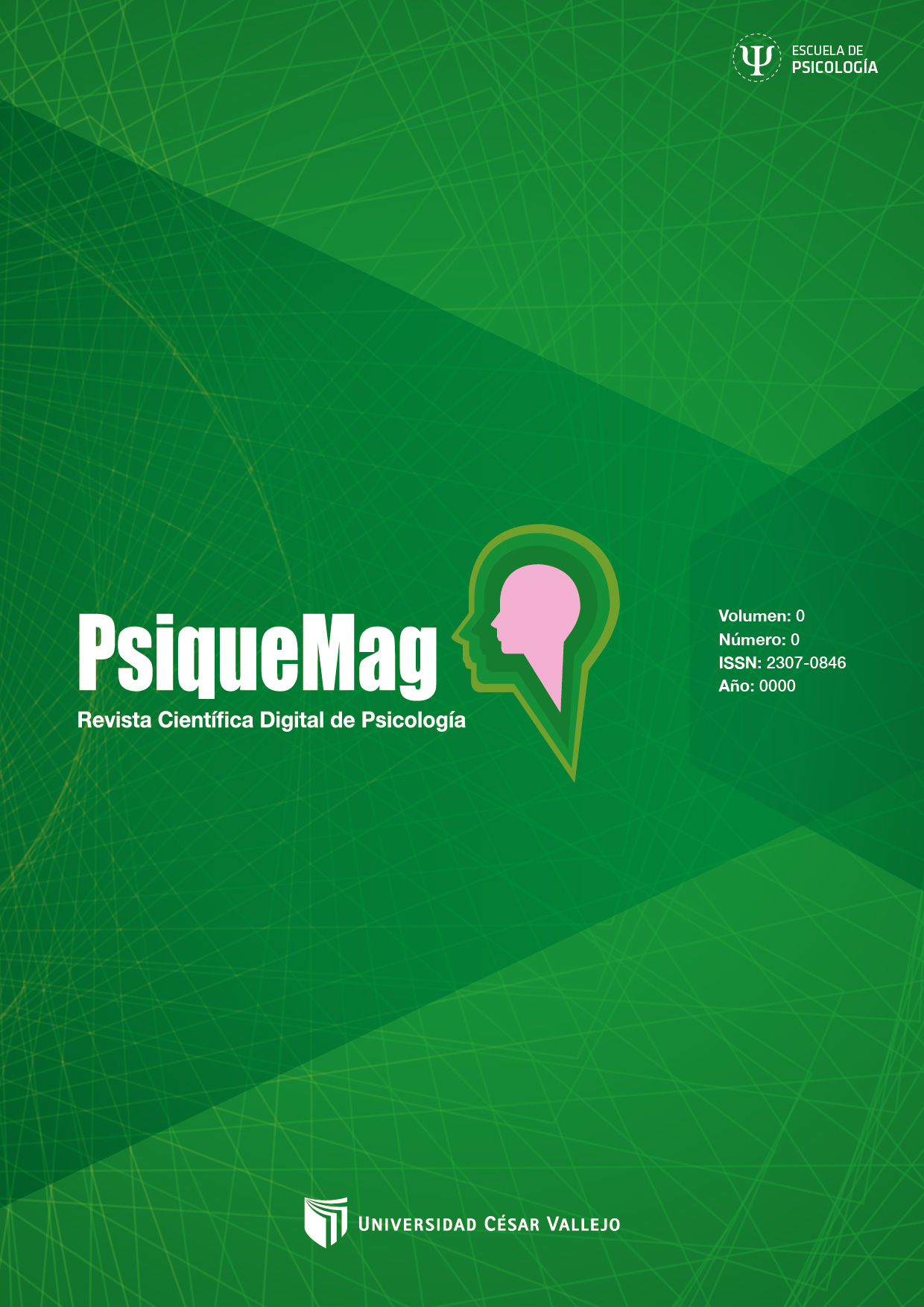Toma de declaraciones en caso de abuso sexual infantil (ASI): Revisión sistemática
Systematic Review
DOI:
https://doi.org/10.18050/psiquemag.v13i2.3108Palabras clave:
Abuso sexual infantil, Psicología de la memoria, Psicología del testimonioResumen
El abuso sexual infantil (ASI) es una grave problemática global que impacta a millones de niños. La psicología de la memoria y del testimonio ha reconocido distorsiones en el recuerdo, pero también ha creado estrategias para mitigarlas al tratar los testimonios de menores abusados. Este estudio se centra en los aportes de estas ramas psicológicas para obtener testimonios confiables en casos de violencia sexual infantil. Tras una revisión sistemática de dos décadas según los lineamientos PRISMA, con 61 investigaciones analizadas, se categorizaron los resultados en: procedimientos de entrevista, involucrados y características del menor. Se evidenció que los relatos de niñas y niños, incluso en edad preescolar, pueden ser coherentes y detallados si se recopilan adecuadamente.
Citas
Las referencias marcadas con un asterisco indican los estudios incluidos en la revisión sistemática.
*Agnew, S. E., & Powell, M. B. (2004). The effect of intellectual disability on children's recall of an event across different question types. Law and Human Behavior, 28, 273-294. https://doi.org/10.1023/B:LAHU.0000029139.38127.61
*Ahern, E. C., Stolzenberg, S. N., McWilliams, K., & Lyon, T. D. (2016). The effects of secret instructions and yes/no questions on maltreated and non‐maltreated children's reports of a minor transgression. Behavioral Sciences & the Law, 34(6), 784-802. https://doi.org/10.1002/bsl.2277
Alonzo-Proulx, A., & Cyr, M. (2016). Factors predicting central details in alleged child sexual abuse victims’ disclosure. Journal of Forensic Psychology Practice, 16(3), 129-150. https://doi.org/10.1080/15228932.2016.1172422
Andrews, S. J., & Lamb, M. E. (2019). Lawyers’ question content and children’s responses in Scottish criminal courts. Psychology, Crime & Law, 25(10), 1008-1027. https://doi.org/10.1080/1068316X.2019.1611829
Andrews, S. J., Ahern, E. C., & Lamb, M. E. (2017). Children's uncertain responses when testifying about alleged sexual abuse in Scottish courts. Behavioral sciences & the law, 35(3), 204-224. https://doi.org/10.1002/bsl.2286
*Andrews, S.J., & Lamb, M.E. (2014). The effects of age and delay on responses to repeated questions in forensic interviews with children alleging sexual abuse. Law and Human Behavior, 38(2), 171-80. https://doi.org/10.1037/lhb0000064
*Andrews, S. J., Lamb, M. E., & Lyon, T. D. (2015). Question types, responsiveness and self‐contradictions when prosecutors and defense attorneys question alleged victims of child sexual abuse. Applied Cognitive Psychology, 29(2), 253-261. https://doi.org/10.1002/acp.3103
*Benedan, L., Powell, M. B., Zajac, R., Lum, J. A., & Snow, P. (2018). Suggestibility in neglected children: The influence of intelligence, language, and social skills. Child abuse & neglect, 79, 51-60. https://doi.org/10.1016/j.chiabu.2018.01.005
Berlinerblau, V. (2017) Abuso sexual contra niños, niñas y adolescentes: Una guía para tomar acciones y proteger sus derechos. UNICEF. https://www.unicef.org/argentina/sites/unicef.org.argentina/files/2018-04/proteccion-AbusoSexual_contra_NNyA-2016.pdf
Berrocal-Aragonés, G.A., Uribe-Bravo, K. A., Delgado Ramos, E. (2024). Hacia protocolos científicamente informados: El caso del abuso sexual infantil (ASI) [Manuscrito presentado para su publicación]
Blalock, S. J., & Reyna, V. F. (2016). Using fuzzy-trace theory to understand and improve health judgments, decisions, and behaviors: A literature review. Health Psychology, 35(8), 781. https://doi.org/10.1037/hea0000384
Brainerd, C. J., & Reyna, V. F. (1990). Gist is the grist: Fuzzy-trace theory and the new intuitionism. Developmental Review, 10(1), 3–47. https://doi.org/10.1016/0273-2297(90)90003-M
Brainerd, C. J., & Reyna, V. F. (2002). Fuzzy-trace theory and false memory. Current Directions in Psychological Science, 11(5), 164-169. https://doi.org/10.1111/1467-8721.00192
Brainerd, C. J., & Reyna, V. F. (2019). Fuzzy-trace theory, false memory, and the law. Policy Insights from the Behavioral and Brain Sciences, 6(1), 79-86. https://doi.org/10.1177/2372732218797143
*Brown, D., Lewis, C., Stephens, E., & Lamb, M. (2017). Interviewers’ approaches to questioning vulnerable child witnesses: The influences of developmental level versus intellectual disability status. Legal and Criminological Psychology, 22(2), 332-349. https://doi.org/10.1111/lcrp.12104
Buck, J. A., London, K., & Wright, D. B. (2011). Expert testimony regarding child witnesses: Does it sensitize jurors to forensic interview quality?. Law and Human Behavior, 35, 152-164. https://doi.org/10.1007/s10979-010-9228-2
Burrows, K. S., Bearman, M., Dion, J., & Powell, M. B. (2017). Children’s use of sexual body part terms in witness interviews about sexual abuse. Child abuse & neglect, 65, 226-235. https://doi.org/10.1016/j.chiabu.2017.02.001
Cabrera, C., Torres, H., & Harcourt, S. (2020). The neurological and neuropsychological effects of child maltreatment. Aggression and violent behavior, 54, 101408. https://doi.org/10.1016/j.avb.2020.101408
*Chae, Y., Goodman, G. S., Eisen, M. L., & Qin, J. (2011). Event memory and suggestibility in abused and neglected children: Trauma-related psychopathology and cognitive functioning. Journal of Experimental Child Psychology, 110(4), 520–538. https://doi.org/10.1016/j.jecp.2011.05.006
*Chae, Y., Kulkofsky, S., Debaran, F., Wang, Q., & Hart, S. L. (2014). Low‐SES children's eyewitness memory: The effects of verbal labels and vocabulary skills. Behavioral sciences & the law, 32(6), 732-745. https://doi.org/10.1002/bsl.2145
*Connolly, D. A., Price, H. L., & Gordon, H. M. (2010). Judicial decision making in timely and delayed prosecutions of child sexual abuse in Canada: A study of honesty and cognitive ability in assessments of credibility. Psychology, Public Policy, and Law, 16(2), 177–199. https://doi.org/10.1037/a0019050
Cossins, A., Goodman-Delahunty, J., & O'Brien, K. (2009). Uncertainty and misconceptions about child sexual abuse: Implications for the criminal justice system. Psychiatry, Psychology and Law, 16(3), 435-452. https://doi.org/10.1080/13218710902930234
*Danby, M. C., Brubacher, S. P., Sharman, S. J., & Powell, M. B. (2017). The effects of one versus two episodically oriented practice narratives on children's reports of a repeated event. Legal and Criminological Psychology, 22(2), 442–454. https://doi.org/10.1111/lcrp.12110
Delgado Ramos, E., Uribe Bravo, K. A., & Berrocal Aragones, G. A. (2023). Superando las trampas de la memoria: 23 aportes para declaraciones en casos de violencia sexual. Psicoperspectivas, 22(3), 1-16. https://doi.org/10.5027/psicoperspectivas-Vol22-Issue3-fulltext-2908
Diamond, N. B., Armson, M. J., & Levine, B. (2020). The Truth Is Out There: Accuracy in Recall of Verifiable Real-World Events. Psychological science, 31(12), 1544–1556. https://doi.org/10.1177/0956797620954812
*Dietze, P. M., Powell, M. B., & Thomson, D. M. (2010). Mental reinstatement of context with child witnesses: does it matter whether context is reinstated ‘out loud’? Psychology, Crime & Law, 16(5), 439–448. https://doi.org/10.1080/10683160902905871
*Earhart, B., Brubacher, S. P., Powell, M. B., Westera, N. J., & Goodman-Delahunty, J. (2017). Judges’ delivery of ground rules to child witnesses in Australian courts. Child Abuse & Neglect, 74, 62-72. https://doi.org/10.1016/j.chiabu.2017.08.005
Earhart, B., La Rooy, D. J., Brubacher, S. P., & Lamb, M. E. (2014). An examination of “don't know” responses in forensic interviews with children. Behavioral sciences & the law, 32(6), 746-761. https://doi.org/10.1002/bsl.2141
Eisen, M. L., Goodman, G. S., Qin, J., Davis, S., & Crayton, J. (2007). Maltreated children's memory: accuracy, suggestibility, and psychopathology. Developmental psychology, 43(6), 1275. https://doi.org/10.1037/0012-1649.43.6.1275
Estrada, L. M. (2019). La cámara gesell: una herramienta para la entrevista de niños en los procesos de familia. Inter: Revista de Direito Internacional e Direitos Humanos da UFRJ, 2(1) 1-.23. https://revistas.ufrj.br/index.php/inter/article/view/25557
*Evans, A. D., & Roberts, K. (2009). The effects of different paraphrasing styles on the quality of reports from young child witnesses. Psychology, Crime & Law, 15(6), 531–546. https://doi.org/10.1080/10683160802385398
*Feltis, B. B., Powell, M. B., & Roberts, K. P. (2011). The effect of event repetition on the production of story grammar in children's event narratives. Child abuse & neglect, 35(3), 180-187. https://doi.org/10.1016/j.chiabu.2010.11.004
*Flogliati, R., & Bussey, K. (2015). The effects of cross-examination on children’s coached reports. Psychology, Public Policy, and Law, 21(1), 10–23. https://doi.org/10.1037/law0000036
*Foster, I., Talwar, V., & Crossman, A. (2022). The role of rapport in eliciting children’s truthful reports. Applied Developmental Science, 1-17. https://doi.org/10.1080/10888691.2022.2058507
*Goodman, G. S., Bottoms, B. L., Rudy, L., Davis, S. L., & Schwartz-Kenney, B. M. (2001). Effects of past abuse experiences on children’s eyewitness memory. Law and Human Behavior, 25(3), 269–298. https://doi.org/10.1023/A:1010797911805
Gosse, L. L., & Roberts, K. P. (2014). Children’s use of a ‘time line’to indicate when events occurred. Journal of Police and Criminal Psychology, 29(1), 36-43. https://doi.org/10.1007/s11896-013-9118-x
*Gudjonsson, G., Vagni, M., Maiorano, T., & Pajardi, D. (2020). The relationship between trauma symptoms and immediate and delayed suggestibility in children who have been sexually abused. Journal of investigative psychology and offender profiling, 17(3), 250-263. https://doi.org/10.1002/jip.1554
*Gustafsson, H. C., Coffman, J. L., Harris, L. S., Langley, H. A., Ornstein, P. A., & Cox, M. J. (2013). Intimate partner violence and children’s memory. Journal of Family Psychology, 27(6), 937–944. https://doi.org/10.1037/a0034592
Henry, L., Ridley, A., Perry, J., & Crane, L. (2011). Perceived credibility and eyewitness testimony of children with intellectual disabilities. Journal of Intellectual Disability Research, 55(4), 385-391. https://doi.org/10.1111/j.1365-2788.2011.01383.x
*Hershkowitz, I., Lamb, M. E., Katz, C., & Malloy, L. C. (2015). Does enhanced rapport-building alter the dynamics of investigative interviews with suspected victims of intra-familial abuse?. Journal of Police and Criminal Psychology, 30, 6-14. https://doi.org/10.1007/s11896-013-9136-8
Hsu, C. W., & Teoh, Y. S. (2017). Investigating event memory in children with autism spectrum disorder: Effects of a computer-mediated interview. Journal of autism and developmental disorders, 47, 359-372. https://doi.org/10.1007/s10803-016-2959-2
Hubbard, K., Saykaly, C., Lee, K., Lindsay, R. C. L., Bala, N., & Talwar, V. (2016). Children's recall accuracy for repeated events over multiple interviews: Comparing information types. Psychiatry, Psychology and Law, 23(6), 849-862. https://doi.org/10.1080/13218719.2016.1256015
Jiménez Cortés, C., & Martín Alonso, C. (2006). Valoración del testimonio en abuso sexual infantil (A.S.I.). Cuadernos de Medicina Forense, 43–44. https://doi.org/10.4321/S1135-76062006000100007
Joanna Briggs Institute. (2017). Checklist for Systematic Reviews and Research Synthesesis. https://jbi.global/sites/default/files/2019-05/JBI_Critical_Appraisal-Checklist_for_Systematic_Reviews2017_0.pdf
*Karni-Visel, Y., Hershkowitz, I., Lamb, M. E., & Blasbalg, U. (2019). Facilitating the expression of emotions by alleged victims of child abuse during investigative interviews using the Revised NICHD Protocol. Child maltreatment, 24(3), 310-318. https://doi.org/10.1177/1077559519831382
*Karni-Visel, Y., Hershkowitz, I., Lamb, M. E., & Blasbalg, U. (2022). Emotional valence and the types of information provided by children in forensic interviews. Child Abuse & Neglect, 129, 105639. https://doi.org/10.1016/j.chiabu.2022.105639
Katz, C., & Hershkowitz, I. (2013). Repeated interviews with children who are the alleged victims of sexual abuse. Research on Social Work Practice, 23(2), 210-218. https://doi.org/10.1177/1049731512467511
*Kim, T. K., Choi, S., & Shin, Y. J. (2011). Psychosocial factors influencing competency of children's statements on sexual trauma. Child abuse & neglect, 35(3), 173-179. https://doi.org/10.1016/j.chiabu.2010.09.005
Kissos, L., Goldner, L., Butman, M., Eliyahu, N., & Lev-Wiesel, R. (2020). Can artificial intelligence achieve human-level performance? A pilot study of childhood sexual abuse detection in self-figure drawings. Child abuse & neglect, 109, 104755. https://doi.org/10.1016/j.chiabu.2020.104755
*Klemfuss, J. Z., Cleveland, K. C., Quas, J. A., & Lyon, T. D. (2017). Relations between attorney temporal structure and children's response productivity in cases of alleged child sexual abuse. Legal and criminological psychology, 22(2), 228-241. https://doi.org/10.1111/lcrp.12096
Krähenbühl, S., & Blades, M. (2006). The effect of question repetition within interviews on young children’s eyewitness recall. Journal of Experimental Child Psychology, 94(1), 57-67. https://doi.org/10.1016/j.jecp.2005.12.002
*Kyriakidou, M., Blades, M., & Carroll, D. (2014). Inconsistent findings for the eyes closed effect in children: the implications for interviewing child witnesses. Frontiers in psychology, 5, 448. https://doi.org/10.3389/fpsyg.2014.00448
Lawson, M., & London, K. (2017). Children's memory for conversations after a 1-year delay. Journal of Applied Research in Memory and Cognition, 6(3), 328-336. https://doi.org/10.1016/j.jarmac.2017.07.001
*Lee, S., & Kim, J. (2021). Rapport quality in investigative interviews: Effects on open-ended questions and free recall responses. Police Practice and Research, 22(1), 996-1008. https://doi.org/10.1080/15614263.2020.1786691
Loftus E. F., & Palmer J. C. (1974). Reconstruction of automobile destruction: An example of the interaction between language and memory. Journal of Verbal Learning and Verbal Behavior, 13(5), 585–589. https://doi.org/10.1016/S0022-5371(74)80011-3
Loftus, E. F., & Pickrell, J. E. (1995). The formation of false memories. Psychiatric Annals, 25(12), 720–725. https://doi.org/10.3928/0048-5713-19951201-07
Macleod, E., Gross, J., & Hayne, H. (2016). Drawing conclusions: The effect of instructions on children's confabulation and fantasy errors. Memory, 24(1), 21-31. https://doi.org/10.1080/09658211.2014.982656
*McWilliams, K., Goodman, G. S., Lyons, K. E., Newton, J., & Avila-Mora, E. (2014). Memory for child sexual abuse information: Simulated memory error and individual differences. Memory & Cognition, 42, 151-163. https://doi.org/10.1016/10.3758/s13421-013-0345-2
*Miragoli, S., Procaccia, R., Camisasca, E., & Di Blasio, P. (2020). How are sexually abused children interviewed during criminal proceedings in Italy?. European Journal of Developmental Psychology, 17(2), 246-262. https://doi.org/10.1016/10.1080/17405629.2019.1573665
Miranda, J. K., Rojas, C., Crockett, M. A., & Azócar, E. (2021). Perspectivas de niños y niñas sobre crecer en hogares con violencia de género en la pareja. Anales de Psicología/Annals of Psychology, 37(1), 10-20. https://doi.org/10.6018/analesps.429651
Muñoz, J. M., González-Guerrero, L., Sotoca, A., Terol, O., González, J. L., & Manzanero, A. L. (2016). La entrevista forense: obtención del indicio cognitivo en menores presuntas víctimas de abuso sexual infantil. Papeles del psicólogo, 37(3), 205-216. https://www.papelesdelpsicologo.es/pdf/2777.pdf
*Murfett, R., Powell, M. B., & Snow, P. C. (2008). The effect of intellectual disability on the adherence of child witnesses to a “story grammar” framework. Journal of intellectual and developmental disability, 33(1), 2-11. https://doi.org/10.1080/13668250701829811
*O’Neill, S., & Zajac, R. (2013). The role of repeated interviewing in children's responses to cross‐examination‐style questioning. British Journal of Psychology, 104(1), 14-38. https://doi.org/10.1037/a0031538
Otgaar, H., Chan, J. C., Calado, B., & La Rooy, D. (2019). Immediate interviewing increases children's suggestibility in the short term, but not in the long term. Legal and Criminological Psychology, 24(1), 24-40. https://doi.org/10.1111/lcrp.12137
Otgaar, H., Howe, M. L., & Dodier, O. (2022). What can expert witnesses reliably say about memory in the courtroom? Forensic Science International: Mind and Law, 3, 100106. https://doi.org/10.1016/j.fsiml.2022.100106
Page, M. J., McKenzie, J. E., Bossuyt, P. M., Boutron, I., Hoffmann, T. C., Mulrow, C. D., ... & Moher, D. (2021). Declaración PRISMA 2020: una guía actualizada para la publicación de revisiones sistemáticas. Revista Española de Cardiología, 74(9), 790-799.https://doi.org/10.1016/j.recesp.2021.06.016
*Pichler, A. S., Powell, M., Sharman, S. J., Zydervelt, S., Westera, N., & Goodman-Delahunty, J. (2021). Inconsistencies in complainant's accounts of child sexual abuse arising in their cross-examination. Psychology, Crime & Law, 27(4), 341-356. https://doi.org/10.1080/1068316X.2020.1805743
Poole, D. A., & Dickinson, J. J. (2011). Evidence supporting restrictions on uses of body diagrams in forensic interviews. Child abuse & neglect, 35(9), 659-669. https://doi.org/10.1016/j.chiabu.2011.05.004
*Powell, M. B., & Hughes-Scholes, C. H. (2009). Evaluation of the questions used to elicit evidence about abuse from child witnesses: Australian study. Psychiatry, psychology and Law, 16(3), 369-378. https://doi.org/10.1080/13218710902930325
*Price, H. L., Connolly, D. A., & Gordon, H. M. (2006). Children's memory for complex autobiographical events: Does spacing of repeated instances matter?. Memory, 14(8), 977-989. https://doi.org/10.1080/09658210601009005
Principe, G. F., & London, K. (2022). How parents can shape what children remember: Implications for the testimony of young witnesses. Journal of Applied Research in Memory and Cognition, 11(3), 289. https://doi.org/10.1037/mac0000059
Priolo-Filho, S., Goldfarb, D., Shestowsky, D., Sampana, J., Williams, L. C., & Goodman, G. S. (2018). Judgments regarding parental alienation when parental hostility or child sexual abuse is alleged. Journal of Child Custody, 15(4), 302-329. https://doi.org/10.1080/15379418.2018.1544531
*Saykaly, C., Crossman, A., Morris, M., & Talwar, V. (2016). Question type and its effect on children's maintenance and accuracy during courtroom testimony. Journal of Forensic Practice, 18(2), 104-117. https://doi.org/10.1108/JFP-01-2015-0010
Saywitz, K. J., Wells, C. R., Larson, R. P., & Hobbs, S. D. (2019). Effects of interviewer support on children’s memory and suggestibility: Systematic review and meta-analyses of experimental research. Trauma, Violence, & Abuse, 20(1), 22-39. https://doi.org/10.1177/1524838016683457
*Sharman, S. J., Powell, M. B., & Roberts, K. P. (2011). Children's ability to estimate the frequency of single and repeated events. International Journal of Police Science & Management, 13(3), 234-242. https://doi.org/10.1350/ijps.2011.13.3.243
Siddaway, A. P., Wood, A. M., & Hedges, L. v. (2019). How to Do a Systematic Review: A Best Practice Guide for Conducting and Reporting Narrative Reviews, Meta-Analyses, and Meta-Syntheses. Annual Review of Psychology, 70(1), 747–770. https://doi.org/10.1146/annurev-psych-010418-102803
*Stolzenberg, S. N., & Lyon, T. D. (2014). How attorneys question children about the dynamics of sexual abuse and disclosure in criminal trials. Psychology, Public Policy, and Law, 20(1), 19–30. https://doi.org/10.1037/a0035000
Sumampouw, N. E., Otgaar, H., La Rooy, D., & De Ruiter, C. (2020). The quality of forensic child interviewing in child sexual abuse cases in Indonesia. Journal of Police and Criminal Psychology, 35, 170-181. https://doi.org/10.1007/s11896-019-09342-5
*Szojka, Z. A., Nicol, A., Frenguelli, N. D., Rooy, D. L., & Henderson, H. (2022). The impact of multiple interviews on the accuracy and narrative coherence of children’s memories. Psychology, Crime & Law, 28(10), 980-1003. https://doi.org/10.1080/1068316X.2021.1984479
*Vagni, M., Maiorano, T., & Pajardi, D. (2021). Effects of post-traumatic stress disorder on interrogative suggestibility in minor witnesses of sexual abuse. Current Psychology, 1-14. https://doi.org/10.1007/s12144-020-01253-7
Van Zyl, L. E., Gaffaney, J., van der Vaart, L., Dik, B. J., & Donaldson, S. I. (2024). The critiques and criticisms of positive psychology: A systematic review. The Journal of Positive Psychology, 19(2), 206-235.https://doi.org/10.1080/17439760.2023.2178956
Vara, A., Manzanero, A. L., & Vallet, R. (2021). Víctimas de abuso sexual especialmente vulnerables: obtención del testimonio. Derecho & Sociedad, (57), 1-39. https://doi.org/10.18800/dys.202102.008
Wixted, J. T., & Wells, G. L. (2017). The relationship between eyewitness confidence and identification accuracy: A new synthesis. Psychological Science in the Public Interest, 18(1), 10–65. https://doi.org/10.1177/1529100616686966
*Wyman, J., Foster, I., Crossman, A., Colwell, K., & Talwar, V. (2019). The efficacy of free‐recall, cognitive load, and closed‐ended questions when children are asked to falsely testify about a crime. Applied Cognitive Psychology, 33(4), 544–560. https://doi.org/10.1002/acp.3494
*Wyman, J., Tong, D., Foster, I., Crossman, A., & Talwar, V. (2022). The effectiveness of cognitive instructions when children provide true and false eyewitness reports of another’s transgression. Police Practice and Research, 23(3), 290-307. https://doi.org/10.1080/15614263.2021.1954923
Zhang, H. H., Roberts, K. P., & Teoh, Y. S. (2019). Children's recall and source monitoring of a repeated event using a timeline as an interview aid. Applied Cognitive Psychology, 33(2), 176-187. https://doi.org/10.1002/acp.3451
Descargas
Publicado
Cómo citar
Número
Sección
Licencia
Derechos de autor 2024 Karla Anamaría Uribe-Bravo, Gabriela Berrocal-Aragonés, Enrique Delgado Ramos

Esta obra está bajo una licencia internacional Creative Commons Atribución 4.0.
Usted es libre de:
- Compartir — copiar y redistribuir el material en cualquier medio o formato
- El licenciador no puede revocar estas libertades mientras cumpla con los términos de la licencia.
Bajo las condiciones siguientes:
-
Reconocimiento — Debe reconocer adecuadamente la autoría, proporcionar un enlace a la licencia e indicar si se han realizado cambios<. Puede hacerlo de cualquier manera razonable, pero no de una manera que sugiera que tiene el apoyo del licenciador o lo recibe por el uso que hace.













